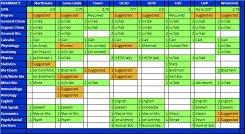As you can see, another book arrived today in the mail. Pocket Guide for Pharmacy Technicians. (I love the Amazon Prime service.) I'll be taking a look through this later, but for now, let's just take a look at the Table of Contents (There are plenty of sub-subcategories that I didn't list to keep this post to a manageable length.):
1 - The Foundation of Pharmaceutical Care
- Educational Requirements - Pharmacist
- Educational Requirements - Pharmacy Technician
- Certification Examination for the Pharmacy Technician
- Continuing Education
- Job Opportunities
- Places of Eployment
- Code of Ethics
2 - Drug Regulation and Control
- Federal Food, Drug, and Cosmetic Act (FDCA)
- Controlled Substances Act (CSA) of 1970
- Poison Prevention Packaging Act (PPPA)
- Drug Listing Act of 1972
- Drug Regulation reform Act of 1978
- Omnibus Budget Reconciliation Act of 1990 (OBRA '90)
- Occupational Safety and Health Act of 1970
- Health Insurance Portability and Accountability Act (HIPAA'96)
- New Drug Approval
- Law and the Pharmacy Technician
3 - Pharmaceutical terminology and Abbreviations
- Medical and Pharmacy Abbreviations
- Medication Errors
- ISMP's List of
Error-Prone Abbreviations, Symbols, and
Dose Designations
- Arabic and Roman Numerals on Prescriptions
- Drug Names
4 - Pharmacy Calculations
- Arabic Numbers and Roman Numberals
- The Metric System
- The Household System
- International Units
- Fractions
- Decimals
- Percents, Rations, and Proportions
- Calculation of Oral Drugs
- Calculation of Parenteral Dosages
- Pediatric Dosage Calculations
- Allegation Alternate
5 - Prescriptions
- The Prescription Order Form
- Parts of the Prescription
- Processing the Prescription Order
- Prescription Refilling
6 - Dosage Forms and Administration of Medications 99
- The Seven Rights of Medication Administration
- Drug Forms
- Principles of Drug Administration
7 - Community or Retail Pharmacy
- Duties of the Pharmacy Technician in the Community Pharmacy
- Organization of the Retail Pharmacy
8 - Hospital or Institutional Pharmacy
- Hospital Pharmacy
- Organization of the Hospital Pharmacy
- The Roles and Duties of Pharmacy
- Technicians in Hospitals
- Medication Orders
- Medication Dispensing Systems
- Purchasing Systems
- Order Processing
- Storage of Medicaitons
- Inventory Management
- Safety
- The Policy and Procedure Manual
- Regulatory Agencies That Oversee Hospital Pharmacy
9 - Advanced Pharmacy
- Mail-Order Pharmacy
- Internet Pharmacy
- Home Infusion Pharmacy
- Hospice Pharmacy
- Nuclear Pharmacy
- Long-Term-Care Pharmacy
10 - Nonsterile Compounding
- Equipment
- Compounded Preparations
- Compounding Processes
- Compounding Records and Documents
- Commonly Compounded Products
- Repackaging
11 - Sterile Compounding
- Issues Related to Sterile Compounding
- Role of the Pharmacy Technician in Sterile Compounding
- Types of Sterile Formulations
- Equipment for Sterile Compounding
- Laminar Airflow Hoods
- Large-Volume Parenteral Solutions
- Small-Volume Parenteral Solutions
- Basic Considerations for Sterile Compounding
- Uses for Sterile Compounding
- Aseptic Technique
- Sterile Compounding of Solutions
- Compounding and Drug-Preparation Errors
- Packaging
- Labeling
- Storage
- Quality Control and Quality Assurance
12 - Medication Errors
- Occurrence of Medication Errors
- Prescribing Errors
- Dispensing Errors
- Administering Errors
- The Patient's Role in Medication Errors
- Avoiding Medication Errors
- Medication Error Reporting
- Negligence and Malpractice Penalties
13 - Computer Systems in the Pharmacy
- Components of a Computer System
- Computer System Databases
- Computer System Functions
- Technology and HIPAA
- Automation
14 - Pharmacy Operation
- The Role of the Pharmacy Manager
- Profitability of the Pharmacy Practice
- Inventory Turnover Rates
- Automated Work Systems
- Ordering
- Purchasing Procedures
- Pricing
- Repackaging
- Disposal of Drugs
- Accounting
- Receiving
- Bar Coding
- Returning Products
- Drug Recalls
- Record Keeping
15 - Billing and Health Insurance
- Payment
- Coding System
- Understanding Insurance Policies
- Insurance Health Plans
- Insurance Forms
16 - Biopharmaceutics
- Biopharmaceutics
17 - Human Response to Drug Activity
- Factors Influencing the Effects of Drugs
18 - Drug Effects and Drug Classifications
- Central Nervous System
- Endocrine System
- Cardiovascular System
- Muscloskeletal System
- Immune System
- Respiratory System
- Antineoplastic Drugs
- Sensory System
- Digestive System
APPENDIX A - Professional Organizations
APPENDIX B - Professional Journals
APPENDIX C - State Boards of Pharmacy
APPENDIX D - Converting Measurements
APPENDIX E - Medial Symbols and Abbreviations
APPENDIX F - The Most Common Poisonous Substances and Their Antidotes
APPENDIX G - The Most Commonly Prescribed Drugs in 2005
APPENDIX H - Controlled Substances in the United States and Canada
APPENDIX I - Pregnancy Categories: FDA Assigned
APPENDIX J - Drug/Food Interactions
APPENDIX K - Drugs that Should Not Be Crushed
APPENDIX L - Pharmaceutical Companies
APPENDIX M - Common Sound-Alike Drug Names
APPENDIX N - Nomogram
APPENDIX O - Drug Identification Guide





















